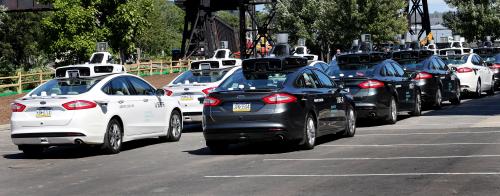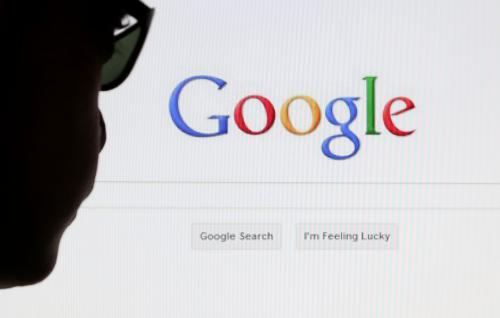This blog post is the second of a four-part series about the year ahead in economic development, including topics on improving capitalism, global growth forecasts, and the end of aid.
2018 is a year of many anniversaries. Some 50 years ago, in 1968, student protests started a broader social movement that ushered in more democratic societies in the West; and 10 years ago the world experienced its greatest economic crisis since the great depression.
But I want to focus on another, less obvious milestone. Around 1988, a full generation ago, the world reached a tipping point in personal computing. Back then, personal computers were already invented but the global text processing market was still dominated by ever more sophisticated typewriters, such as this Smith Corona Electronic. A decade later, they had completely disappeared.
I predict that we are, in 2018, at another such tipping point, where a new digital revolution will herald a fourth industrial revolution or Industry 4.0. A first big breakthrough is already happening in the field of household robots. Cleaning robots have started to take over our homes. By 2019 some 31 million of them, mostly made in China, are projected to come on the shelves.
A friend of mine is delighted by hers: She estimates that the robot saves her about one hour each week. Based on the value of the time she saves at the OECD minimum wage (of around 8-10 euros per hour), her cleaning robot will have paid for itself after just 25 weeks. The machine also keeps your house cleaner because you can deploy it as often as you like, and it will cover the spaces humans tend to miss, like under the couch.
However, the most dramatic transformation under way is in transportation. The technology is here; it’s only being held back by public policy. Unlike household appliances, cars, busses, and trucks have a clear public safety dimension that explains why politicians remain cautious, too cautious in my view.
My prediction is that anybody buying a new conventional car in 2018, with intentions of keeping it for the next 15 years, will have done so for the very last time. While many new cars have a lot of computing power, including self-driving options to support parking or keeping the lane on highways, these upgrades are like those we saw in typewriters three decades ago, with computer chip-powered mini-screen that let you store some 10 words before inserting into the paper.
I believe the coming revolution in mobility will be much more radical. The internet is now fully embedded in new cars, but the next phase will be to engineer the reverse process, that is, to fully integrate the car into the internet, as Uber and other car-sharing applications have begun to do.
Once driverless shared cars are available on scale, people will soon realize they can be hypermobile without owning a car. In fact, it’s already true that owning a car often impedes mobility and freedom: You have to park it in congested cities and leave it somewhere if you’ve had a drink. Existing car sharing apps are just the vanguard of a much more sophisticated system that will look like the combination of a public metro system and individual car ownership. Imagine a fleet of driverless vehicles, like trolleys roaming around town, at your service when you press the button on your app.
For my home country of Germany, where conventional cars are the backbone of the economy and a national symbol, the transition is bound to be painful. Today, we have more than 45 million registered cars. Even if all 80 million Germans decided to ride at once, there would be no need for the back seats. In reality, cars are mostly unused. They sit idle on the side of the road 95 percent of the time, eating up valuable public space.
Some will argue that driverless/ownerless cars are not technologically ready and possibly harmful. The hiccups they’ve experienced, I believe, are minor bumps toward an irreversible transformation. And we should take doomsayers with a grain of salt. Do you remember how, in the early days of cell phones, they were rumored to be causing brain tumor?
The upsides are huge. Imagine how much time we can collectively save by not having to wait for any form of transport or being stuck in traffic. I lived in Jakarta, Indonesia, some years back, and in that city alone there are millions of hours lost every day in traffic: time that could be spent productively or leisurely.
A final note on this year’s most important global event: the World Cup which kicks off on June 14 in Russia. Germany is among the bookmakers’ favorites and I will put my own money on the Mannschaft, especially as it embodies the values of a new generation, where strong individual skills are paired with a very robust team effort.
Still, if history is any guide there are risks on the horizon, because 2018 also marks the 40th anniversary of the opprobrium of Cordoba. In 1978, Germany went to Argentina as the reigning World Champion, and experienced probably the most painful loss since championships were played. Austria, my current home, won in Cordoba 3-2 with two late goals from Hans Krankl on June 21, 1978, an upset so monumental that the Austrian reporter Edi Finger, erupted in truly Latin fashion (a joy even for non-German speakers).
However, if Germany can overcome this bad omen, it will pull off a historic victory. No other team doubled down on a World Cup triumph since Brazil in 1958 and 1962. In that case, we could just kill two birds with one stone and appoint our coach Joachim Low to become chancellor of Germany, assuming we have not been able to form a government until then.







Commentary
The future of mobility: Why your new car is like an electronic typewriter
January 17, 2018